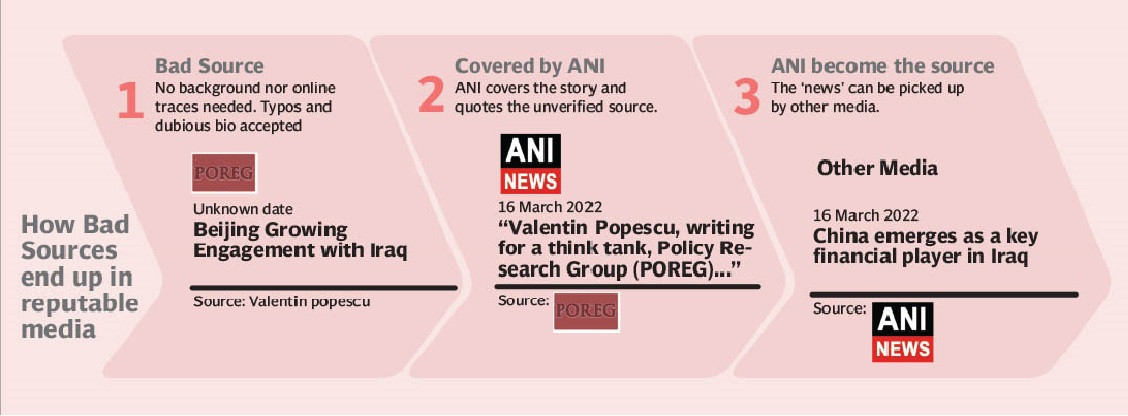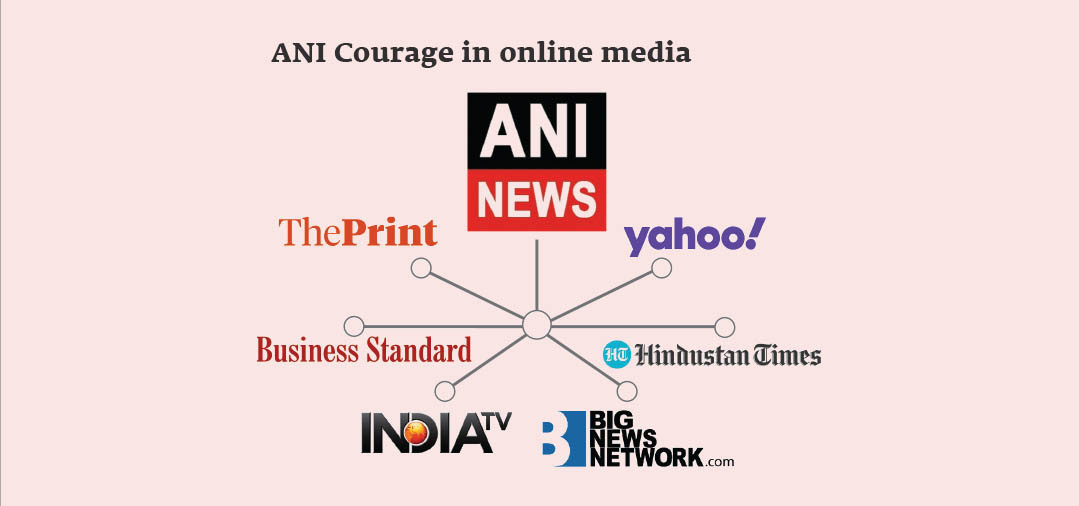With free speech under assault at home, ostensibly in the guise of combating fake news, India has paradoxically emerged as a major purveyor of misleading content aimed at discrediting foreign adversaries. Across borders, a far-reaching network of disinformation, supported by deceptive pro-India news outlets and fake NGOs, has also been actively involved in shaping global perceptions about Prime Minister Narendra Modi’s Hindu nationalist government for more than a decade.
In 2020, a damning report by the EU DisinfoLab uncovered a sophisticated misinformation network that had been active for over 15 years. The Brussels-based non-profit, dedicated to combating misinformation within the European Union, revealed extensive operations comprising over 260 pro-Indian local news sites spanning across more than 65 countries.
Traced back to the New Delhi-based Srivastava Group, this expansive web of disinformation was created to discredit India’s rivals, mainly Pakistan and China. Furthermore, EU DisinfoLab detailed the operation’s broader objectives, which included influencing decision-making processes within international bodies such as the UN Human Rights Council (UNHRC) and the European Parliament in favour of the Indian government’s official narrative. The network, according to the findings, engaged in various fraudulent tactics, including the resurrection of defunct NGOs at the UN, impersonation of experts, and the laundering of content from fake media to real media outlets, thereby reaching millions across South Asia and beyond.
In its findings, the EU DisinfoLab singled out the Srivastava Group—a suspicious business conglomerate—and Asian News International, India’s largest video news agency and a local partner of Reuters, as key players in the global misinformation campaign. Both rely heavily on amplifying content and disinformation campaigns to further Indian narratives – particularly those in favour of the BJP administration.
The Srivastava Group, operating through its intricate web of fake news networks, has spearheaded numerous pro-India campaigns worldwide, particularly those aligned with the BJP administration. According to findings by the EU DisinfoLab, this shadowy entity has gone as far as establishing think tanks to advocate for the Modi government. A year prior to the release of the DisinfoLab's report, researchers scrutinised the Srivastava Group for orchestrating a visit by far-right Members of the European Parliament to Indian-occupied Kashmir. It was revealed that these visits were organised by the International Institute of Non-Aligned Studies (IINS), a think tank established by the Srivastava Group in Brussels. These events unfolded shortly after the occupied region was deprived of its special status and was subjected to a security and communications lockdown by the far-right government in New Delhi.
Interestingly, while the EU DisinfoLab stopped short of implicating the Modi administration in their report, the Indian Ministry of External Affairs (MEA) was quick to issue a rebuttal, pre-emptively denying any government involvement in the scandal. This response from New Delhi surprised many, prompting Suhasni Haider, an Indian journalist, to share her observations on X, the platform formerly known as Twitter. “MEA denies the European agency's claim of an Indian 'network of disinformation'. What’s odd is that the report doesn't actually blame the government,” she remarked in her post, highlighting the apparent anomaly.
Fast-forward to 2023, Asian News International (ANI) found itself under renewed scrutiny amid its increased prominence and financial success during Prime Minister Narendra Modi’s tenure. In its latest report titled “#BadSources: How Indian News Agency ANI Quoted Sources That Do Not Exist,” released last year, the EU DisinfoLab disclosed that ANI had published hundreds of articles entirely relying on false sources. According to the Brussels-based agency, ANI’s content not only promoted the Indian government’s agenda but also disparaged its rivals, Pakistan and China. Concurrently, ANI’s articles served as primary sources for numerous Indian media outlets, as well as online news portals such as Yahoo News. Given the substantial stake held by the international news powerhouse Thomson Reuters in ANI, its raw multimedia content is also readily available to Reuters subscribers. “With this expansive network, ANI indirectly shapes the news consumed by millions of Indians,” cautioned the EU DisinfoLab in its report.

The EU DisinfoLab's research revealed that in over 200 articles, ANI relied on reports provided by the Canadian think tank International Forum for Rights and Security (IFFRAS). Published between May 2021 and January 2023, many of these reports purportedly featured comments made at conferences organised by the think tank. However, the Brussels-based agency found that most of the 70 academics and experts said to have spoken at these conferences ‘did not exist at all’, while a few who could be identified denied knowledge of the events. Consequently, the EU DisinfoLab concluded that ANI employs a number of non-existent organisations, bloggers, and journalists as sources in its article. These articles then serve as content for many well-established media outlets across India, making ANI a purveyor of news to millions of Indians.
While ANI has rejected all claims made by the EU DisinfoLab, it is worth noting that The Caravan, a local magazine in India, has also accused the news agency of favouring the Indian government’s narrative in its reporting. Despite the controversies surrounding ANI, the news platform has enjoyed unfettered access to the BJP leadership, including Modi himself, who has granted several exclusive interviews to the agency.
Following the alarming disclosures by the EU DisinfoLab spanning four years, analysts caution about potential implications for India's international reputation as a democratic nation. They suggest that the extensive networks controlled by entities like the Srivastava Group or ANI may prompt a re-evaluation of India's standing on the global stage. However, Dr Talat Wizarat, a former professor of International Relations at the University of Karachi, highlights a significant disparity. “It's striking how the West’s response to India's transgressions exposes its double standards," said Wizarat. “While Russia faced scrutiny and isolation over allegations of spreading misinformation during the 2016 US Presidential Election, India seems to enjoy a level of exemption from those shaping the global order in the West,” she added.
A new player: The Sunday Guardian
While attention has focused on the activities of the New Delhi-based Srivastava Group and ANI, other actors and platforms have quietly perpetuated the spread of disinformation. One such entity is the Sunday Guardian, owned and operated by Kartikeya Sharma, Founder and Promoter of iTV Network. The paper has produced numerous false articles aimed at tarnishing Pakistan’s reputation, dedicating pages to constructing narratives depicting it as a failed state. In one instance, it published an unverified threat directed at the New Zealand cricket team. An article titled ‘New Zealand cricket team may face terror threat in Pakistan,’ published on August 21, 2021, preceded New Zealand's cancellation of the tour due to security concerns roughly a month later. This article, published by the Sunday Guardian, uses former Taliban commander Ehsanullah Ehsan to amplify a purported security threat from the Islamic State in Pakistan. In a more recent article, penned once again by the former Taliban commander, Pakistan is accused of promoting proxies in Afghanistan. Similarly, a piece published in December 2023 under Ehsanullah Ehsan’s name alleges Pakistan of sheltering ISIS leadership. When asked about a former Taliban commander's articles being published in an Indian news paper, experts said: “While India claims to staunchly oppose terrorism, a domestic news platform continues to provide space and coverage to a known terrorist, the former Taliban commander. What does that tell you about India?”
Interestingly, Ehsan’s articles are published without a disclosed dateline.
But Pakistan isn't the sole focus of the Sunday Guardian’s negative coverage. It seems that anyone or any nation on Narendra Modi’s blacklist finds themselves on the publication’s radar. Recently, Canada accused India of assassinating one of its citizens, whom India labelled as a Sikh separatist. In an article attributed to Dinesh Kumar, the Sunday Guardian goes so far as to dub Canada as the new Pakistan.
Likewise, China, another of Modi’s adversaries, has faced repeated criticism on the Sunday Guardian’s pages. The news portal features numerous articles amplifying Taiwan’s apprehensions regarding China’s potential invasion of its territory.
Upon closer examination of ANI and the Srivastava Group’s modus operandi, it becomes evident that the Sunday Guardian is also under the influence of pro-Modi proprietors. The connections are not difficult to uncover. Kartikeya Sharma, owner of the Sunday Guardian among other media ventures, recently secured a fiercely contested election for the Rajya Sabha, or Upper House of Parliament, in Haryana, which according to Indian media reports, was only made possible because of BJP’s support. If that weren't enough to establish the link, just five days ago, Venod Sharma, leader of the Haryana Jan Chetna Party and Kartikeya's father, publicly endorsed Modi's BJP and commended the Prime Minister's policies.

What does India gain?
In the sphere of global geopolitics, India’s engagement in propaganda tactics isn't a novel occurrence, according to experts. “Even the United States has historically employed propaganda methods,” remarked Wizarat, a seasoned Karachi-based expert. India, according to a senior national security source, who preferred not to be identified, aims to sway international audiences through a network of interconnected media outlets that echo and reinforce each other's narratives. This tactic, the source explained, serves to obfuscate manipulation while shaping public opinion regarding Pakistan and amplifying negative perceptions of India’s adversaries.
“The lack of international scrutiny of Indian disinformation and influence operations in the West and other countries has emboldened the government in New Delhi to the extent that its intelligence agencies are assassinating foreign citizens abroad,” added the source. “Today the world is gradually waking up to the reality that India is a malign actor in the international community that has scant regard for international law or the rules based order.”
Echoing similar views, Wizarat said: “The report by EU Disinfolab four years ago was a wake-up call for the West, but they decided to look the other way. That itself has emboldened Modi and his operatives significantly.” According to Wizarat, India’s external spy agency, the Research and Analysis Wing, commonly known as RAW, has long been tapping into criminal networks to carry out clandestine operations in the region. Ignoring such violations in South Asia has enabled India and its agencies to carry out similar operations in the West," she said, referring to the recent assassinations carried out by Indian operatives in Canada and a similar plot that was thwarted by US agencies.
Muted response
When asked why Modi or India is allowed to get away with actions such as creating disinformation networks, Dr Melissa Beattie, media theorist at Southern New Hampshire University, said: “The US is looking for strategic allies in this region, especially against China and Russia, and when any country is looking for or trying to maintain strategic alliances it will often mute its response to what that particular country does.” Expanding on Beattie’s observation, Wizarat asserted that the West might come to regret its inaction regarding India’s transgressions. “What's happening to us today could happen to them tomorrow. Modi’s misinformation campaigns aren’t limited to Pakistan or China; we're already witnessing them being expanded against Canada.”
Following Prime Minister Justin Trudeau's accusation of Indian government involvement in the fatal shooting of a Canadian Sikh leader, the proliferation of negative news articles targeting Canada has surged on platforms like the Sunday Guardian. The media outlet has dedicated several pages on its website to news about the case.

India's misinformation affair
In the aftermath of Israel’s assault on Gaza, a torrent of videos and photos purportedly depicting the conflict inundated social media, blurring the lines between truth and fiction. According to an analysis by Al Jazeera, much of this content carried undertones of anti-Palestinian sentiment and Islamophobia. Interestingly, a significant portion of this pro-Israel misinformation originated from right-leaning accounts based in India. Among the myriad of false narratives that were circulated, some depicted Hamas beheading a young Jewish boy on the back of a truck. BOOM, a reputable fact-checking service in India, revealed that the pro-Israel disinformation campaign was driven by numerous verified Indian X users. "They promoted narratives that depict Palestinians as inherently violent," the platform stated.
This is not the first time India has been accused of a misinformation campaign. In 2021, senior BJP leaders blamed Muslims for spreading Covid. Known for his incendiary speeches, Kapil Mishra, a local BJP leader tweeted: "Tablighi Jamaat people have started spitting on the doctors and other health workers. It's clear, their aim is to infect as many people as possible with coronavirus and kill them."
Although debunked, rumours circulated that Tablighi Jamaat members were refusing quarantine, assaulting hospital staff, and throwing bottles of urine at Hindus. Hashtags like "coronaJihad," "CoronaTerrorism," and "CoronaBombsTablighi" gained traction on Twitter in India. Mainstream Indian media followed by labelling Tablighi Jamaat members as coronavirus "superspreaders."
According to Dr Melissa Beattie, in India, propaganda serves to manipulate emotions such as fear, anger, and a sense of belonging by leveraging sociocultural discourses. The media theorist pointed out the strategic use of emotional triggers in propagandistic messaging. "Propaganda in India capitalises on sociocultural discourses to incite emotional reactions, particularly within targeted audiences, with the aim of exploiting political and sociocultural fault lines for strategic gains," she explained.
According to a 2022 report by The New York Times, the upsurge of misinformation in India coincides with the rise of Narendra Modi as the Hindu nationalist prime minister. In numerous instances, experts believe, his administration appears to reap political benefits from the dissemination of misinformation within the country.
